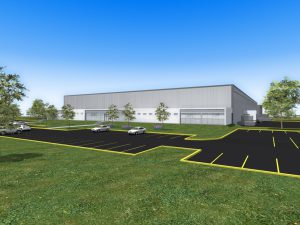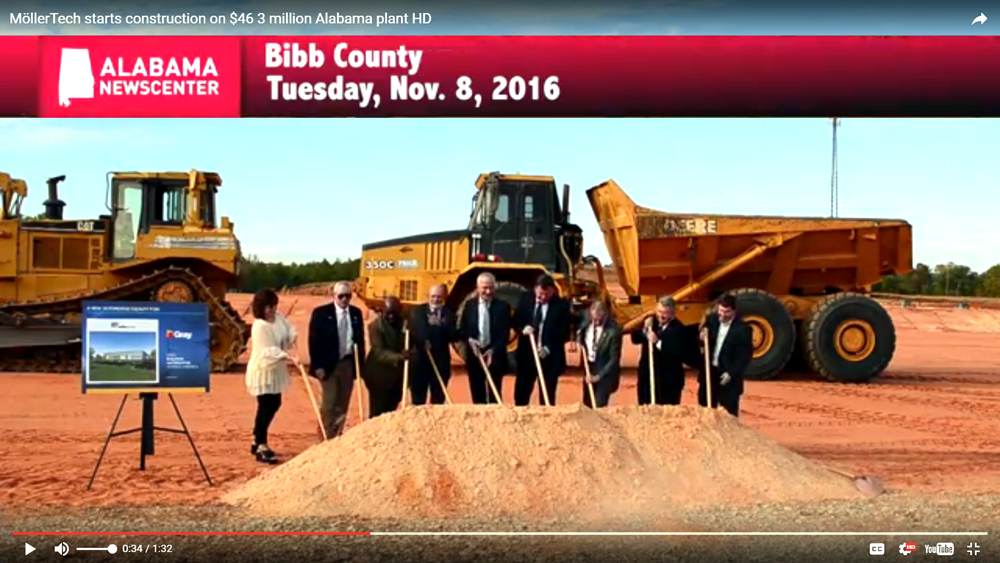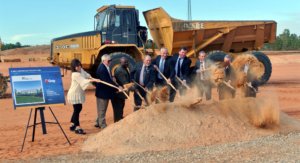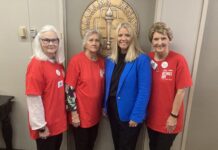CLICK HERE TO WATCH THE VIDEO:
November 9, 2016
WOODSTOCK, Alabama – Global auto supplier MollerTech on Tuesday officially launched work on a $46.3 million manufacturing facility near this tiny Bibb County community, a project that will create more than 220 jobs and spur growth in this rural region.
MollerTech’s selection of the Bibb County site also shows that Alabama’s rural areas are now better positioned to compete for new capital investment and jobs, according to Greg Canfield, secretary of the Alabama Department of Commerce.

“Not too long ago, conventional wisdom said large companies with big projects aren’t going to go to rural settings,” Canfield said after a groundbreaking ceremony for MollerTech on Tuesday afternoon. “That’s not true any more.”
At the 20-acre site near Woodstock (population: 900), bulldozers have already flattened a hillside location in the Scott G. Davis Industrial Park for MollerTech’s 150,000-square-foot factory. It will become the German company’s flagship U.S. manufacturing facility, joining locations in Georgia and Michigan.
At Tuesday’s groundbreaking ceremony, Steve Jordan, president of MollerTech’s North American operation, said the company is already eager to hold a ribbon-cutting ceremony for the Bibb County facility.
“We’re a family company, and we like to work with local communities,” Jordan told reporters.
MollerTech’s facility – formally announced just three weeks ago — is expected to be in full production by 2019. It will supply interior parts for next-generation sports utility vehicles produced at Mercedes-Benz’s Alabama assembly plant in neighboring Tuscaloosa County.
The company is first automotive supplier to locate in Bibb County, despite the fact that the Woodstock area selected by MollerTech is just minutes away from the Mercedes mothership in Vance.
“As a rural community, the impact of this project will be felt for many, many years in Bibb County,” Bibb County Commissioner Ricky Hubbard said at the event.
BOOSTING RURAL DEVELOPMENT
After Tuesday’s groundbreaking, Secretary Canfield said recent project activity underscores that rural communities across Alabama are receiving increased consideration when it comes to economic development projects.
The Alabama Department of Commerce and its allies have been working strategically to generate more economic development action in the state’s rural areas. These regions have historically faced disadvantages such as small labor pools and inferior transportation networks.
“We’re going to continue to focus on growth and job opportunities, and capital investment, in rural Alabama,” Secretary Canfield said.
Beginning last year, companies locating a qualified project in one of Alabama’s 25 “targeted” counties – that is, a county with fewer than 25,000 residents – became eligible for enhanced job creation and investment credits.
As part of its project agreement, MollerTech was granted an enhanced job credit, valued in total at $2.7 million. In addition, the company will receive assistance from AIDT, the state’s primary workforce development agency, in assembling its employee base.
Another company, Two Rivers Lumber Co., received enhanced job credits for a $65 million sawmill project in rural Marengo County.
AIDT, part of the Alabama Department of Commerce, is an important part of the puzzle in rural economic development. In fact, a MollerTech human resources official was scheduled to meet with AIDT today to start the process of pre-screening and training the company’s Alabama workforce.
“We’ve got the workforce capability,” Secretary Canfield said. “We’ve got the talent and expertise at AIDT to assemble a workforce with the types of skills these employers need.”
An updated version of the Accelerate Alabama strategic economic development growth plan, now in the works, also focuses on facilitating rural economic development.
“We’re beginning to see significant economic development activity taking place in rural areas,” Secretary Canfield said. “We’ve got a long way to go, but our Accelerate Alabama 2.0 strategy is really focused on developing opportunities in rural Alabama.”















